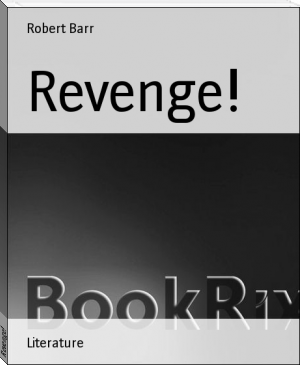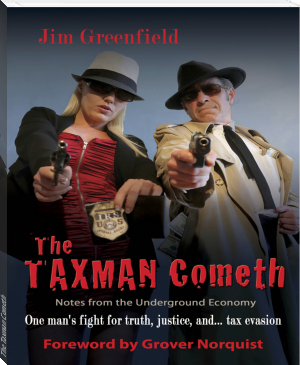Revenge! - Robert Barr (best interesting books to read txt) 📗

- Author: Robert Barr
Book online «Revenge! - Robert Barr (best interesting books to read txt) 📗». Author Robert Barr
Ever yours,
DRUCE.
The Sneed girls called on Mrs. Edward Druce.
TRANSFORMATION.
If you grind castor sugar with an equal quantity of chlorate of potash, the result is an innocent-looking white compound, sweet to the taste, and sometimes beneficial in the case of a sore throat. But if you dip a glass rod into a small quantity of sulphuric acid, and merely touch the harmless-appearing mixture with the wet end of the rod, the dish which contains it becomes instantly a roaring furnace of fire, vomiting forth a fountain of burning balls, and filling the room with a dense, black, suffocating cloud of smoke.
So strange a combination is that mystery which we term Human Nature, that a touch of adverse circumstance may transform a quiet, peaceable, law-abiding citizen into a malefactor whose heart is filled with a desire for vengeance, stopping at nothing to accomplish it.
In a little narrow street off the broad Rue de Rennes, near the great terminus of Mont-Parnasse, stood the clock-making shop of the brothers Delore. The window was filled with cheap clocks, and depending from a steel spring attached to the top of the door was a bell, which rang when any one entered, for the brothers were working clockmakers, continually busy in the room at the back of the shop, and trade in the neighbourhood was not brisk enough to allow them to keep an assistant. The brothers had worked amicably in this small room for twenty years, and were reported by the denizens of that quarter of Paris to be enormously rich. They were certainly contented enough, and had plenty of money for their frugal wants, as well as for their occasional exceedingly mild dissipations at the neighbouring cafe. They had always a little money for the church, and a little money for charity, and no one had ever heard either of them speak a harsh word to any living soul, and least of all to each other. When the sensitively adjusted bell at the door announced the arrival of a possible customer, Adolph left his work and attended to the shop, while Alphonse continued his task without interruption. The former was supposed to be the better business man of the two, while the latter was admittedly the better workman. They had a room over the shop, and a small kitchen over the workroom at the back; but only one occupied the bedroom above, the other sleeping in the shop, as it was supposed that the wares there displayed must have formed an almost irresistible temptation to any thief desirous of accumulating a quantity of time-pieces. The brothers took week-about at guarding the treasures below, but in all the twenty years no thief had yet disturbed their slumbers.
One evening, just as they were about to close the shop and adjourn together to the cafe, the bell rang, and Adolph went forward to learn what was wanted. He found waiting for him an unkempt individual of appearance so disreputable, that he at once made up his mind that here at last was the thief for whom they had waited so long in vain. The man's wild, roving eye, that seemed to search out every corner and cranny in the place and rest nowhere for longer than a second at a time, added to Delore's suspicions. The unsavoury visitor was evidently spying out the land, and Adolph felt certain he would do no business with him at that particular hour, whatever might happen later.
The customer took from under his coat, after a furtive glance at the door of the back room, a small paper-covered parcel, and, untying the string somewhat hurriedly, displayed a crude piece of clockwork made of brass. Handing it to Adolph, he said, "How much would it cost to make a dozen like that?"
Adolph took the piece of machinery in his hand and examined it. It was slightly concave in shape, and among the wheels was a strong spring. Adolph wound up this spring, but so loosely was the machinery put together that when he let go the key, the spring quickly uncoiled itself with a whirring noise of the wheels.
"This is very bad workmanship," said Adolph.
"It is," replied the man, who, notwithstanding his poverty-stricken appearance, spoke like a person of education. "That is why I come to you for better workmanship."
"What is it used for?"
The man hesitated for a moment. "It is part of a clock," he said at last.
"I don't understand it. I never saw a clock made like this."
"It is an alarm attachment," replied the visitor, with some impatience. "It is not necessary that you should understand it. All I ask is, can you duplicate it and at what price?"
"But why not make the alarm machinery part of the clock? It would be much cheaper than to make this and then attach it to a clock."
The man made a gesture of annoyance.
"Will you answer my question?" he said gruffly.
"I don't believe you want this as part of a clock. In fact, I think I can guess why you came in here," replied Adolph, as innocent as a child of any correct suspicion of what the man was, thinking him merely a thief, and hoping to frighten him by this hint of his own shrewdness.
His visitor looked loweringly at him, and then with a quick eye, seemed to measure the distance from where he stood to the pavement, evidently meditating flight.
"I will see what my brother says about this," said Adolph. But before Adolph could call his brother, the man bolted and was gone in an instant, leaving the mechanism in the hands of the bewildered clockmaker.
Alphonse, when he heard the story of their belated customer, was even more convinced than his brother of the danger of the situation. The man was undoubtedly a thief, and the bit of clockwork merely an excuse for getting inside the fortress. The brothers, with much perturbation, locked up the establishment, and instead of going to their usual cafe, they betook themselves as speedily as possible to the office of the police, where they told their suspicions and gave a description of the supposed culprit. The officer seemed much impressed by their story.
"Have you brought with you the machine he showed you?"
"No. It is at the shop," said Adolph. "It was merely an excuse to get inside, I am sure of that, for no clockmaker ever made it."
"Perhaps," replied the officer. "Will you go and bring it? Say nothing of this to any one you meet, but wrap the machine in paper and bring it as quickly and as quietly as you can. I would send a man with you, only I do not wish to attract attention."
Before morning the man, who gave his name as Jacques Picard, was arrested, but the authorities made little by their zeal. Adolph Delore swore positively that Picard and his visitor were the same person, but the prisoner had no difficulty in proving that he was in a cafe two miles away at the time the visitor was in Delore's shop, while Adolph had to admit that the shop was rather dark when the conversation about the clockwork took place. Picard was ably defended, and his advocate submitted that, even if he had been in the shop as stated by Delore, and had bargained as alleged for the mechanism, there was nothing criminal in that, unless the prosecution could show that he intended to put what he bought to improper uses. As well arrest a man who entered to buy a key for his watch. So Picard was released, although the police, certain he was one of the men they wanted, resolved to keep a close watch on his future movements. But the suspected man, as if to save them unnecessary trouble, left two days later for London, and there remained.
For a week Adolph slept badly in the shop, for although he hoped the thief had been frightened away by the proceedings taken against him, still, whenever he fell asleep, he dreamt of burglars, and so awoke himself many times during the long nights.
When it came the turn of Alphonse to sleep in the shop, Adolph hoped for an undisturbed night's rest in the room above, but the Fates were against him. Shortly after midnight he was flung from his bed to the floor, and he felt the house rocking as if an earthquake had passed under Paris. He got on his hands and knees in a dazed condition, with a roar as of thunder in his ears, mingled with the sharp crackle of breaking glass. He made his way to the window, wondering whether he was asleep or awake, and found the window shattered. The moonlight poured into the deserted street, and he noticed a cloud of dust and smoke rising from the front of the shop. He groped his way through the darkness towards the stairway and went down, calling his brother's name; but the lower part of the stair had been blown away, and he fell upon the debris below, lying there half- stunned, enveloped in suffocating smoke.
When Adolph partially recovered consciousness, he became aware that two men were helping him out over the ruins of the shattered shop. He was still murmuring the name of his brother, and they were telling him, in a reassuring tone, that everything was all right, although he vaguely felt that what they said was not true. They had their arms linked in his, and he stumbled helplessly among the wreckage, seeming to have lost control over his limbs. He saw that the whole front of the shop was gone, and noticed through the wide opening that a crowd stood in the street, kept back by the police. He wondered why he had not seen all these people when he looked out of the shattered window. When they brought him to the ambulance, he resisted slightly, saying he wanted to go to his brother's assistance, who was sleeping in the shop, but with gentle force they placed him in the vehicle, and he was driven away to the hospital.
For several days Adolph fancied that he was dreaming, that he would soon awake and take up again the old pleasant, industrious life. It was the nurse who told him he would never see his brother again, adding by way of consolation that death had been painless and instant, that the funeral had been one of the grandest that quarter of Paris had ever seen, naming many high and important officials who had attended it. Adolph turned his face to the wall and groaned. His frightful dream was to last him his life.
When he trod the streets of Paris a week later, he was but the shadow of his former portly self. He was gaunt and haggard, his clothes hanging on him as





Comments (0)